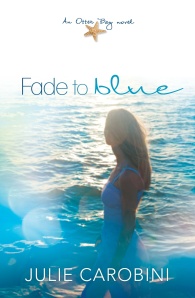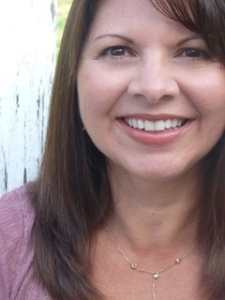 Writer friend and fellow SoCal resident Julie Carobini just released Fade To Blue (B&H Publishing) and is currently touring the Internet and holding various book signings at local book stores. (She has a signing down my way this coming Saturday).
Writer friend and fellow SoCal resident Julie Carobini just released Fade To Blue (B&H Publishing) and is currently touring the Internet and holding various book signings at local book stores. (She has a signing down my way this coming Saturday).
I jumped at the chance to host one of the blog tour days. It’s a delight to have Julie share some thoughts about writing especially in light of yesterday’s article, “Where Are We Going?” And as a double treat, I’ll be posting a review of Fade To Blue (available at Amazon, Barnes & Noble, CBD.com, and many of your fine local book stores) some time later.
In case you’re not familiar with Julie’s work, she’s the author of five novels and countless non-fiction articles. Her specialty, as you can see if you visit her blog or web site is beachy fiction. If you’d like to follow Julie’s cyberspace tour, you’ll find a list of her stops here. Tomorrow is Pam Wiseman‘s turn to feature Fade To Blue.
– – – – – – –

Writing At The Crossroads
By Julie Carobini
I found myself stuck. In my last book, A Shore Thing, one of the supporting characters, Suz, continued to pray for her soon-to-be ex-husband, even as he sat in jail for committing a felony. In Fade to Blue (released this month), Suz became the heroine. I already had a strong sense of her character, so I began the process of asking, “What if …?” and applying those questions to this very real person in my mind. Eventually, I found myself with more questions than answers.
What if …
But just when she does …
What if …
And at about that time …
What if…
As I followed single-mom, Suz, it quickly became apparent that one aspect of the story—her divorce in the midst of faith—would become an issue. So I continued to write and plan, to follow Suz on her path of finding out what she wanted to do, and to learn if her desires matched up with her faith.
Inevitably, my heroine found herself at a crossroads.
May I be honest? If faith wasn’t a thread in this story, I could let my character do or say whatever pop culture dictated. The issue of her divorce might not have been an issue at all and some other conflict would have risen to the top of the plot point chain. In Suz’s case, however, her faith is the point on which she pivots, so how could I ignore her struggle?
As Christians who write, we have to be so careful, though. I’d never want to steer someone wrong, or, as the Bible says, to “cause my brother to stumble.” Yet I have no interest in sermonizing either. Instead, I want my characters, no matter what the issue, to struggle with their decisions the way we all do at times. And that means that as writers we too have to press in to those corners where we inevitably find ourselves.
The answers don’t always come easily. If you write, maybe you’re like me, and you often find yourself listening to the voices of many more than your muse. There are readers, of course, but also reviewers, editors, sales and marketing—even critique partners—all who have opinions about what our characters should or should not do. Daunting, isn’t it? But in Jeremiah 6:16, the Lord gives this advice to savor: “Stand at the crossroads and look; ask for the ancient paths, ask where the good way is, and walk in it, and you will find rest for your souls.”
To writers, this verse suggests standing at the crossroads with our characters. It suggests contemplation, prayer, and continuing to show up and write even through the tough patches.
With Fade to Blue, after I prayed and wrestled to the point of a near-ulcer over my heroine’s decisions, my pastor “happened” to deliver a sermon that provided the perspective necessary to taking that first step out of her crossroads—and I was ready with pen in hand. Don’t you love when that happens? No peptic medication necessary!
I love what Donald Maas says in Writing the Breakout Novel: “Some say success as an author requires a big ego: I say that it requires a big heart.” So true. Not only that, I believe that those big hearts must be softened by our experiences with God’s grace.
Next time you find yourself at a crossroads in your novel, don’t shy away, instead press in. Pray hard. Shut out the voices for a while. Instead, think about what it’s like to hold a seashell, constantly turning it over in your hand. Though they’re often tossed into the sea with nary a glance, seashells are intricately beautiful—even when broken. The more you examine your characters lives, no matter how shattered or sinful they may be—the more beauty can be found. Why? Because it’s in those dark places where God’s grace shines brightest.

![PowerElementsCharacterDevelopment[1000][1]](https://rebeccaluellamiller.files.wordpress.com/2015/05/powerelementscharacterdevelopment10001.jpg?w=205)








Great thoughts. And Suz sounds like an interesting character. Struggle, as much as I hate it in real life and in my characters’ lives, builds strength in us and gives our characters a backdrop against which they can shine like heroes. And if they are shining because God’s grace is shining through them, that’s the best thing of all.
LikeLike
I so want read Fade to Blue! And thanks for the inspirational thoughts on writing! Glad I took a minute to top by! Be blessed!
LikeLike
Thanks Sally for your comment. I so agree! And I’m glad you stopped by too, Rita ~ love the verse on your website.
LikeLike
Oooh! Love that Julie! Thanks for the encouragement.
LikeLike